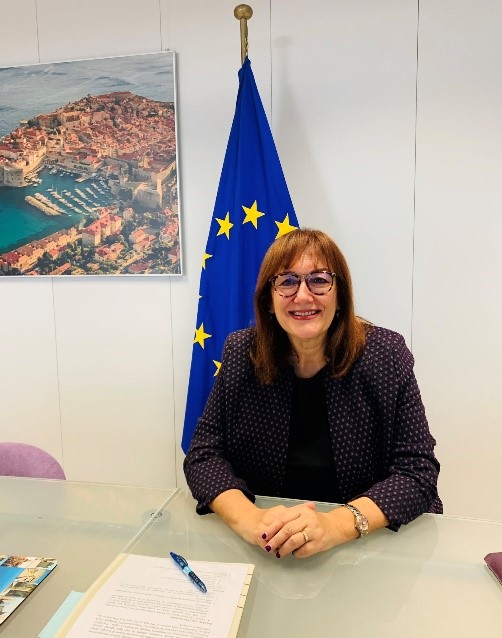On Thursday 19 November 2020, Vice-President of the European Commission Dubravka Šuica addressed the members of the ‘RUMRA & Smart Villages’ Intergroup and engaged in a fruitful discussion regarding the upcoming Long-Term Vision for Rural Areas in Europe.
Rural areas in Europe are home to almost 100 million citizens and represent about half the EU territory. “I think that our joint objective is to offer new perspectives to these communities […] and to walk them through the green, digital, but also demographic transition happening all across the European Union right now” said Vice-President Šuica in her opening statement.
She added that many people living in rural areas currently feel left behind, with almost half of rural citizens without access to a good internet connection, and more than 30 million people living in regions facing the double challenge of low GDP per capita and rapidly aging population. The European Commission’s Long-Term Vision for Rural Areas thus aims to create a new momentum for rural areas, addressing the specific needs of these regions and taking into account their diversity. “I am eager to hear your ideas and to work together” concluded Vice-President Šuica, welcoming the ample practical experience of the members of ‘RUMRA & Smart Villages’. MEP Tomislav Sokol, Intergroup Vice-Chair, moderated the discussion and thanked the Vice-President for her encouraging words.
Emilija Stojmenova, from the Slovenian Council for the Development in Agriculture and the University of Ljubljana, then offered some concrete recommendations grounded in her own personal experience being born in a rural area. Ms Stojmenova highlighted the current digital gap between rural and urban areas, and called for further investment in digital infrastructure as well as in people’s skills, in order to effectively increase rural citizens’ capacity to innovate and implement their ideas. Proper use of modern technology indeed constitutes an opportunity to provide better employment opportunities in rural areas, including for women and young people, and to improve both the management of natural resources and environmental protection.
Ms Stojmenova reiterated the Intergroup’s call for a concrete action plan at European level with tangible and actionable targets. “Rural areas are often seen as losers. They are not.” , she added. We have just failed to invest in their potential in the past. Now more than ever the European Commission and Member States have the opportunity to correct this and make sure we avoid another lost decade of rural development.”
Vice-President Šuica and Cabinet member Ms Desa Srsen then addressed the topics raised by the MEPs representing ‘RUMRA & Smart Villages’ at the meeting. Intergroup Co-Chair MEP Clara Aguilera, together with Intergroup member MEP Sean Kelly, highlighted the challenges facing rural areas in the context of the European Green Deal and the need for targets and incentives, including to promote cleaner energy solutions and tackling the rural air quality issue. Vice-President Šuica agreed that both air quality and resilience to climate change are key priorities.
Intergroup Co-Chair MEP Niklas Nienaß and Intergroup Board Member MEP Cristina Maestre Martin de Almagro, together with Intergroup Vice-Chair MEP Atidzhe Alieva-Veli, asked about specific measures to promote growth for SMEs, invest in rural territories and enquired about the promotion of research, development and innovation to attract talent and modernise rural areas, notably through the Just Transition Mechanism. Finally, MEP Franc Bogovič, Intergroup Co-Chair, pledged that the members of ‘RUMRA & Smart Villages’ are ready to help the Commission in the development of its strategy and are willing to deliver practical solutions to rural challenges.
The Commission emphasized that its ambition for this Long-Term Vision is to unlock the full potential of rural areas in order to make them attractive. To do so, the Commission intends to develop a toolbox maximising the opportunities in rural areas through concrete initiatives. “My ambition is that this vision is actionable and operational” said Vice-President Šuica, mentioning the introduction of targets and the need to improve synergies between the funding available all across the EU’s budget (MFF).
Vice-President Šuica invited intergroup members to answer the online consultation on the Long-Term Vision for the Future of Rural Areas before November 30th. The Commission then announced that a number of thematic workshops will be organised between December 2020 and March 2021, to be concluded by a conference, which will present the results of the consultation as well as the analytical work completed by the Commission. The Long-Term Vision for Rural Areas will then be ready for publication, in the form of a communication, in June 2021.

